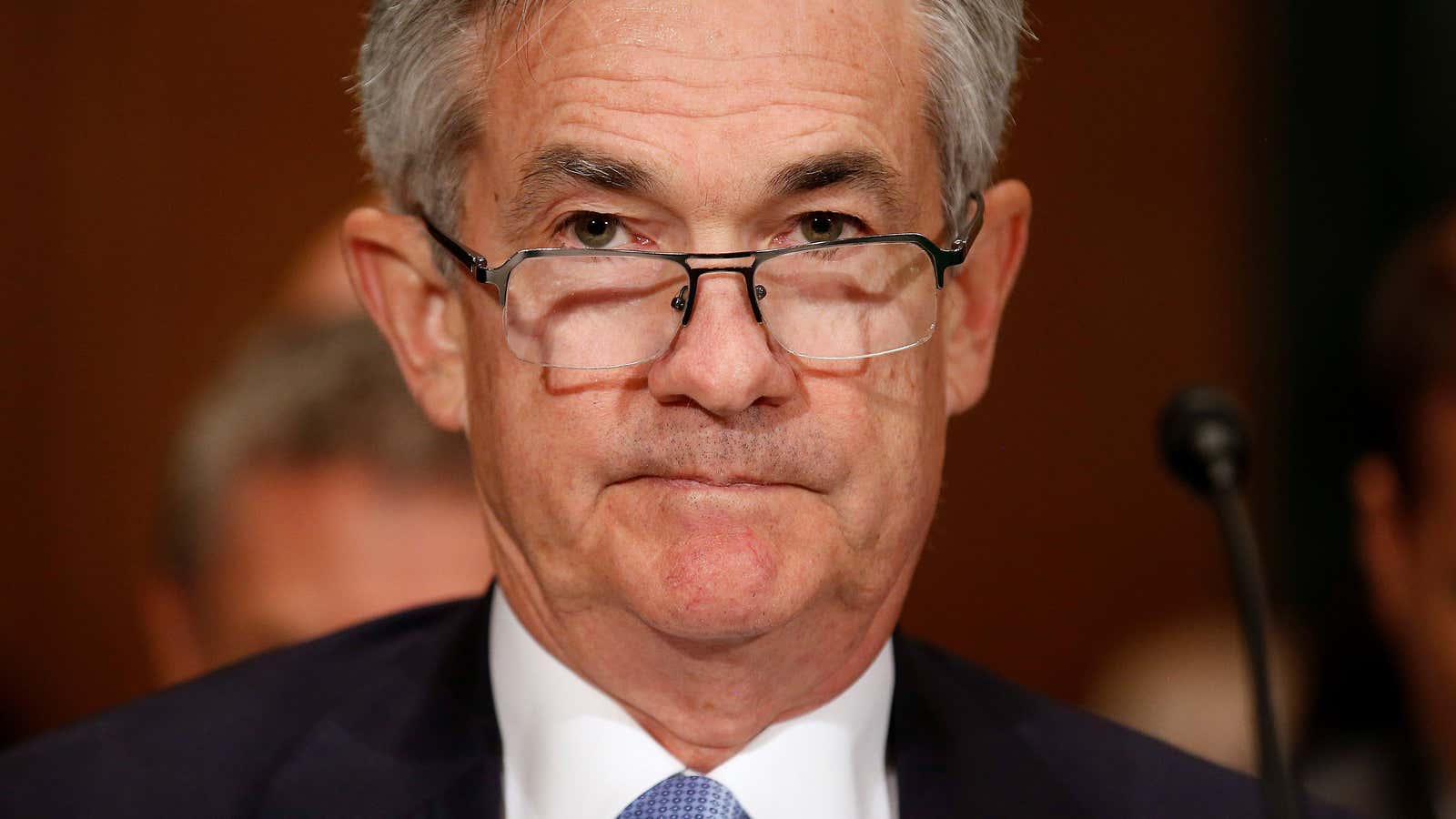After a dizzying season of rumors, twists, and an application process that all too closely mirrored The Apprentice, we appear to have a winner: Jerome Powell is widely expected to be nominated as the next chair of the US Federal Reserve.
According to reports, Donald Trump will name Powell as the next Fed chair as early as this week. He would replace Janet Yellen, an Obama appointment whose term as chair is set to expire in February.
The Fed chair leads the Federal Open Market Committee (FOMC), which sets US monetary policy. A decade after the global financial crisis, a key challenge for the Fed is returning policy to normal, by raising interest rates from historic lows and unwinding the trillions of dollars worth of securities bought to shore up the shaky financial system. It’s a delicate balancing act—there are risks to removing monetary accommodation too soon, and too late.
Who, exactly, is Jerome Powell?
The G.O.P. version of Yellen
For one thing, the 64-year-old is hardly a Fed newcomer. Powell, who goes by “Jay”, was appointed to the Fed Board of Governors in 2012 to fill an unexpired term. Two years later, he was reappointed to a 14-year term. In these hyper-partisan times, it was noteworthy that Obama picked Powell, a registered Republican who did a stint at the Treasury under George H.W. Bush, for the job. He is “tremendously qualified,” the former president said in announcing his nomination.
During his time on the Fed board, Powell has made clear his policy recommendations: a gradual rise in interest rates, a steady shrinking of the balance sheet, and an expectation that soon, the US economy will hit the Fed’s 2% inflation target. Sound familiar? It should, because that’s more or less what Yellen has prescribed during her tenure as chair. The two so rarely differ on policy that Powell has not once cast a dissenting vote in an FOMC meeting. Analysts, like Tom Porcelli, the chief US economist at RBC Capital Markets, have gone so far as to describe Powell as “the G.O.P. version of Yellen.”
So why didn’t Trump just reappoint Yellen? She steered the Fed through the rocky post-crisis years, led markets through four rate hikes, and most recently, announced the unwinding of $4.5-trillion balance sheet without causing much of a stir. Trump has acknowledged her tact and leadership, insisting he likes and respects her, and that she’s done a good job. Presidents have typically reappointed Fed chairs inherited from their predecessors, as Obama did with Ben Bernanke (nominated by George W. Bush) and Bill Clinton did with Alan Greenspan (nominated by Ronald Reagan).
Trump doesn’t tend to do what presidents typically do, and some argue that he has turned the appointment of the next leader of the Fed, a historically independent institution, into a politicized reality-TV spectacle.
A businessman, not an economist
Unlike many of his predecessors, Jerome Powell doesn’t have a doctorate in economics. Powell graduated with a B.A. in politics from Princeton in 1975 and four years later received a law degree from Georgetown University. He then had stints in both law and investment banking in New York.
Powell’s political career didn’t begin until 1990, when he took up a position at the Treasury. In 1992, he was appointed the Under Secretary of the Treasury, a position in which he investigated major Wall Street banks.
He returned to banking in 1993, and later became a partner at the Carlyle Group, a private equity firm.
This all gives Powell the distinction of being the Fed’s richest board member. As of 2011, Powell had assets valued between $21.3 million and $72.2 million, according to disclosure forms he filed prior to his Fed appointment. For context, Jeremy Stein, a former Harvard professor who joined the Fed at the time, reported assets valued at up to $6.3 million.
Powell’s biggest policy difference with Yellen is that he thinks the Fed should go easier on banks. Yellen has warned that unwinding the stricter regulations imposed after the crisis could be dangerous. Powell, instead, believes the Fed’s role is “one of oversight, not management.”
For his part, Trump has described the Dodd-Frank Act, a set of rules intended to rein in banks after the subprime debacle, a “disaster.” With Powell in charge, the Fed’s approach to financial regulation is likely to change significantly from the Yellen years. On just about everything else, Powell is more like a richer, Republican version of his predecessor.
